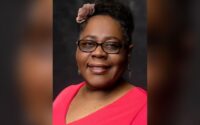Mark Meadows takes the stand in bid to move Georgia election case
Former White House Chief of Staff Mark Meadows took the witness stand in an Atlanta courtroom on Monday as part of his effort to move two criminal charges in Georgia, accusing him of conspiring with former President Donald Trump to overturn the state’s 2020 election results, to federal court.
Meadows, 64, faced questioning by both his attorney and a lawyer representing Fulton County District Attorney Fani Willis’ office, during the hearing at the US District Court for the Northern District of Georgia, where he argued that the actions he took in vetting the Peach State’s 2020 election results fell under the scope of his wide-ranging and unpredictable role as Trump’s chief of staff.
The hearing wrapped late Monday and Federal Judge Steve Jones indicated he will rule on the removal request at a later date but did not give a timetable.
One by one, Meadows’ attorney George Terwilliger listed the activities highlighted in the Fulton County grand jury’s indictment against him – including a visit to a Cobb County voting facility and the scheduling of a call with Georgia election officials to discuss disputed ballots.


For more than an hour, the former White House official insisted that his actions all fell under the purview of his federal role and therefore Willis’ case against him should be heard in federal court.
Georgia state prosecutors assert that his actions fell outside of the scope of his federal position and were more in line with Trump’s official re-election campaign.
“I would try to be aware of everything that was going on,” Meadows said on the witness stand. “I was never paid by the campaign, never supervised the campaign. They had their own structure.”
Meadows said he got involved in the electoral controversy because there were federal interests involved — including the maintenance of “free and fair elections,” managing his boss’s time and the possibility of executive orders being issued as Trump fought to stay in power.

Anna Cross, a lawyer representing the Fulton County DA’s office, repeatedly sought to undermine Meadows’ portrayal during cross-examination, relentlessly asking him what federal policy interests were “advanced” by his actions.
“Would you agree Mr. Meadows that acting solely to advance a campaign goal or interest is outside the role of chief of staff?” she asked the former North Carolina congressman.
Meadows denied that he veered from his official position at any point.
“Serving the president of the United States – and I want to be clear on this your honor — takes on all forms,” he argued.
Cross also hammered Meadows for reaching out to a Georgia election official and asking if a signature verification process could be hastened if they gave money toward the process.
That, she said, was an explicit offer of campaign monies to impact the electoral process.
Meadows countered that he was simply trying to resolve the election questions at Trump’s behest while also handling transfer of power duties to the Biden administration.
“I was trying to land the plane,” Meadows argued.
Meadows, who was booked at Fulton County Jail last week on charges of violating Georgia’s Racketeer Influenced and Corrupt Organizations (RICO) statute and soliciting an official to violate their oath of office, is accused of participating in a January 2021 phone call between Trump, 77, and Georgia Secretary of State Brad Raffensperger during which the former president suggested Raffensperger could help “find 11,780 votes” needed for him to win the state.
“The president of the United States wanted to have this issue resolved and my understanding was to put everyone together,” Meadows said of the infamous call Monday.
At one point, Meadows described a meeting with Trump and former Attorney General Bill Barr, where Barr dismissed the then-president’s election fraud complaints.
“He just said a lot of it had no merits. Some of it – to use his term — was bullshit,” Meadows said of what Barr, who resigned from the Trump administration in December of 2020, told the then-president.

Meadows noted during his testimony that he found the Cobb County vote-counting process clean and professional and that he relayed that assessment to Trump.
He denied performing two acts listed in the indictment, including asking White House personnel director John McEntee to draft a memo to then Vice President Mike Pence on how to delay certifying the election results and texting Georgia secretary of state’s office chief investigator Frances Watson.
“When this came out in the indictment, it was the biggest surprise for me,” Meadows said.
“Me asking Johnny McEntee for this kind of a memo just didn’t happen,” he claimed.

Cross finished her cross-examination by showing an email exchange Meadows had with Trump’s former campaign chief Jason Miller where he refers to them collectively as “we.”
Meadows is among at least five of Trump’s 18 co-defendants in Georgia that are seeking to move their case to federal court, including former Justice Department official Jeffrey Clark, former Georgia Republican Party Chairman David Shafer, Georgia state Sen. Shawn Still and former Coffee County GOP Chairwoman Cathy Latham.
The US District Court for the Northern District of Georgia last week refused Meadows’ emergency request to stave off his arrest by Fulton County authorities in the case.

Raffensperger also took the stand Monday, telling the judge that Meadows repeatedly reached out to him after the state’s votes had already been certified. He declined to call him back on several occasions because he felt it was improper.
“Outreach to this extent was extraordinary,” Raffensperger said, noting that he and his wife received threats after Trump repeatedly bashed his handling of Georgia’s voting process.
He said he finally agreed to a call with Meadows, Trump and several lawyers after being pushed to do so.
Cross played audio of the call Monday, with a clearly agitated Trump asking for access to voter data and asserting widespread fraud.
After getting pushback, Trump exclaimed: “You’re allowed to have a phony election?”
Prosecutors argued that Meadows violated the Hatch Act with his actions, which prohibits members of the executive branch other than the president and vice president from engaging in certain political activities.
Terwilliger pushed back in his closing, arguing that state officials should not be able to define the duties of a presidential chief of staff.


